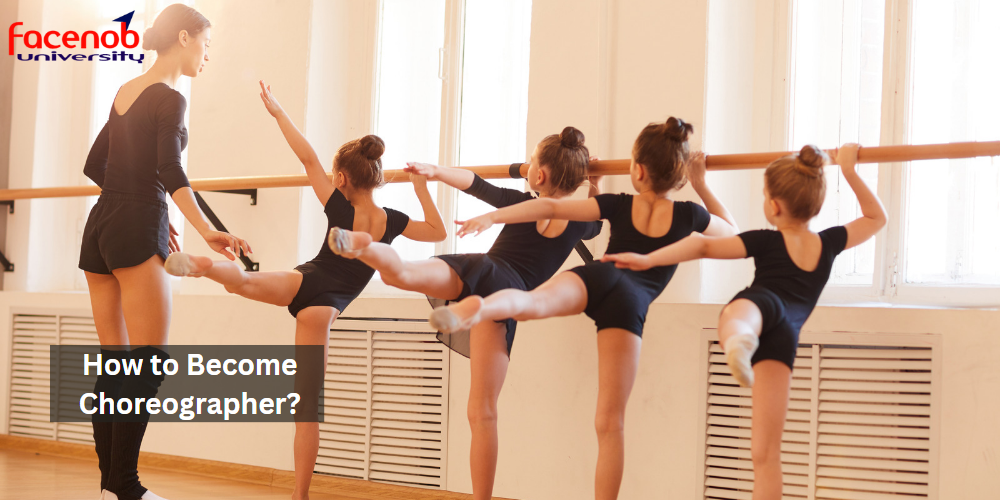How to Become a Choreographer?

Introduction of Choreographer
The sweat comes first, followed by the beauty. Choreographers attempt to captivate an audience by meticulously organizing dances, costumes, music, and visuals…by playing the dancers like a piano.
Similar Job Titles
- Dance Director
- Dance Instructor
- Dance Master
- Dance Teacher
- Dancing Master

Typical Job Responsibilities
What do Choreographers do?
A Dance Director would typically need to:
- Understand the production to generate fresh ideas; understand who they are as artists and what their target audience needs to see.
- Create one-of-a-kind dance and movement routines that elicit powerful human emotions in the judge’s and audience’s hearts and minds.
- Audition dancers for roles in a show or within a dance group; choose the music, dress, set design, and special effects.
- Pay close attention to the music being played; determine the timing and feel of the various dancing steps.
- Create new dance moves and inventive interpretations and modifications of current ones.
- Direct and encourage dancers in technique and practice; create and revise choreography to ensure the dance is ready to rock the audience.
- Record dance moves with great awareness of Choreography’s technical patterns and structures.
- Create one-of-a-kind dance routines by researching new and developing genres of dance as well as other art forms such as theatre, visual arts, and architecture.
- Examine students’ dancing talents to discover what needs improvement or change.
- Assist with administrative tasks for a dance company, such as budgeting.
Standard Work Environment
Dance Director will spend most of their working lives interacting with their dancers in a dance studio, dance hall, or similar setting. Unless otherwise specified during rehearsals, the dress code consists typically of a leotard, tights, and ballet or tap dancing shoes. The actual performance may include appropriate costumes.
Work Schedule
Dance Directors that work in dance schools may have a typical workweek instructing students, but they also spend hours creating new dance routines. Dancers and choreographers work extended days on tours, practising much of the day and performing at night. Choreographers may be required to teach throughout the day and attend additional classes or performances in the evenings.
Employers
Many significant full-time professional dance companies employ resident choreographers and welcome guest choreographers on a seasonal basis.
Choreographers are generally employed by:
- Professional Dance Companies
- Stage & Theater Productions
- Motion Picture Industries
- Private Dance Schools
- Dance Studios
- Local Dance & Performing Arts Companies
- Higher-End Casinos
- Theme Parks
- Drama Departments in Schools
Unions / Professional Organizations
Choreographers seeking professional development or networking with like-minded individuals in their business or occupation should turn to professional groups and organizations. Membership in one or more looks excellent on your CV and helps to boost your credentials and qualifications.
Workplace Challenges
- Physically demanding with the risk of on-the-job injuries and strenuous dance creation and rehearsals pre-production hours.
- Intense competition coupled with intermittent employment
- Need to work daily, including weekends and holidays, when work demands
- Frequent travel to stage performances means time spent away from family and friends.
Suggested Work Experience
Choreographers study several dance genres and learn how to choreograph routines throughout their careers as dancers. Dance and teaching experience is required since you must communicate your thoughts to the dancers. Prospective Choreographers should take advantage of every opportunity to gain experience and improve their dancing abilities by performing frequently. Performing with or choreographing dances for local groups is a great way to start a career. Dancers can break into choreography by assisting well-known choreographers or developing short pieces for their dance groups.
Recommended Qualifications
Almost of choreographers begin their careers as dancers and change occupations after substantial on-the-job training. The majority have a high school diploma.
Some choreographers continue their education after high school and get a bachelor’s degree in acting, fine arts, business administration, or communication. Choreography majors or one-year speciality degrees are available at some universities.
Certifications, Licenses, and Registration
Accredited dance school certificates add to your credentials while providing an intellectual perspective on dance and movement. It can assist you in gaining a professional reputation, standing out in a competitive job market, increasing your prospects of development or promotion, encouraging renewal, and helping you in becoming an independent consultant.
Projected Career Map
Choreographers typically begin their careers as dancers. After learning the routine from the Choreographer, they become Assistant Choreographers, who teach the steps to dancers. The following step is to become an Associate Choreographer, which requires you to submit some steps. You will then progress to the position of Creative Director or Producer. Choreographers may establish their dance groups. They frequently stage and direct performances of their works.
Others, however, become College Teachers after earning a relevant degree. Better choreographic commissions and more remuneration follow recognition.
Choreographers can now be found in various industries other than dance, such as ice skating, choirs, theatre, synchronized sports, cheerleading, cinematography, and gymnastics.
Job Prospects
Dancers who attend schools or conservatories affiliated with a dance company may have a better chance than others of landing jobs as Choreographers at that company.
Beneficial Professional Development
Choreographers must refine their sense of rhythm and musical comprehension. To keep their technique fresh, they must continue to practice dance and attend training classes. They are suggested to attend networking events to share and learn from their colleagues. A postgraduate course in dance or choreography will broaden their horizons and skill set.
Conclusion
Historically, choreographers are born, not made; their talents and passion propel them to it. When your method is excellent, whether it is traditional, sophisticated, innovative, therapeutic, educational, or sensitive, you will become an artist beyond compare—one who commands respect and appreciation.
Advice from the Wise
While dancers attain excellence via their passion, it is a strategy used when they run out of ideas. Practice leads to the required level of perfection.
Read Also: How to Become a Casting Director?
